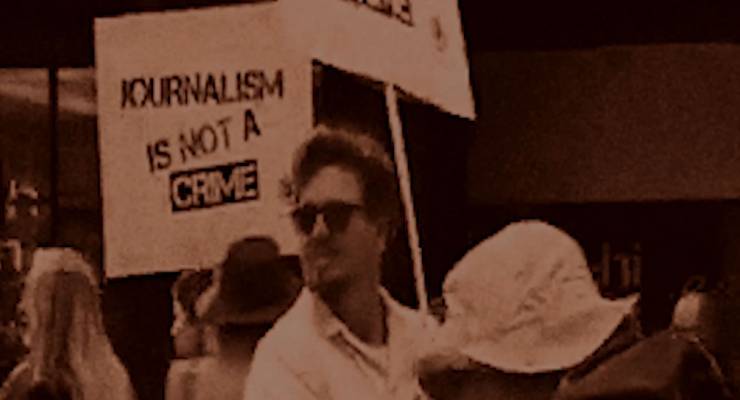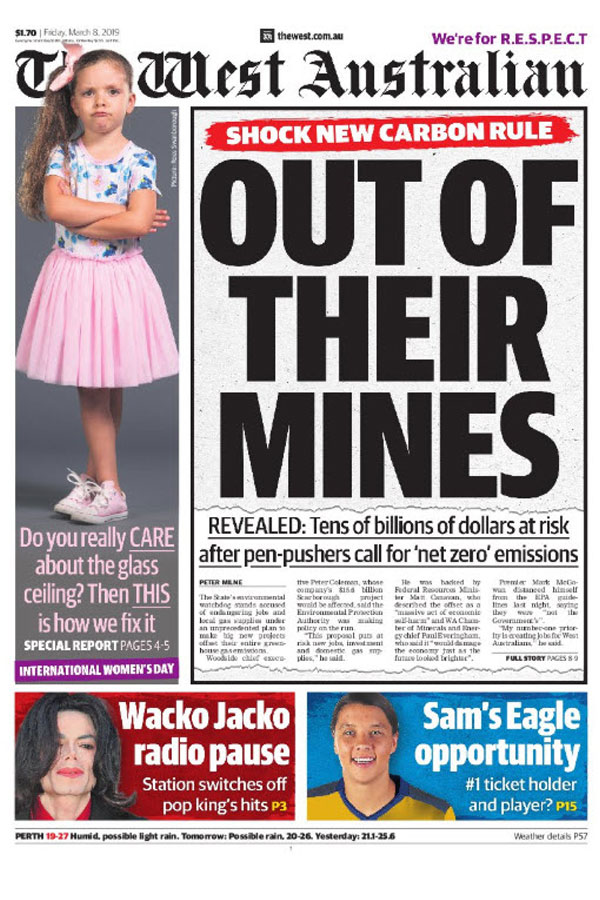
In June, following federal police raids on the ABC’s Sydney offices and a News Corp journalist’s home, editors around the country came out to denounce the attack on press freedom. The story was carried on the front page of almost every major newspaper.
There was one exception. The West Australian, the dominating newspaper in WA, ran a short story on page six about the raids and has published no substantive mention of the high-profile campaign to protect media freedom since.
The way the West downplayed one of the biggest stories about the media in years came as little surprise to close observers of the newspaper. Seven West Media, which owns the paper (as well as the Seven Network, Perth’s Sunday Times and most of the city’s suburban free sheets) was the only major news outlet not represented at Perth’s rally for press freedom in late July, almost two months after the raids. Neale Prior, the West’s personal finance editor and national media section committee member for the MEAA (the journalists’ union) did speak at the rally, but specifically in his capacity as a union member.

The ABC raids were concerned with “The Afghan Files”, an exposé based on defence force leaks about the killing of unarmed citizens by the Australian Defence Force in Afghanistan. And as all his journalists know, Seven West Media boss Kerry Stokes has a deep interest in the military — he chairs the Australian War Memorial and collects Victoria Crosses. He also hired Victoria Cross recipient Ben Roberts-Smith as an executive for Seven in Queensland and former SAS head James McMahon as the chief operating officer of his holding company Australian Capital Equity.
When the military has been in the news, the West has invariably taken the side of defence force personnel. Last year, a Fairfax investigation — now subject to defamation proceedings — cast a shadow on Roberts-Smith’s record in the defence force. The West responded by running interviews defending Roberts-Smith in order to balance the negative coverage from a “rival newspaper”, reporters were told. West journalists, both current and former, have told INQ it was a story that Stokes had a hand in directing.
Kerry Stokes’ interests run far and wide. Australian Capital Equity has 61% of Seven Group Holdings (SGH), which has 41% of Seven West Media. SGH also has interests in Westrac, which sells Caterpillar earth moving equipment, especially within the iron ore, coal, lithium and nickel mining industries in WA and NSW. An oft-cited anecdote mentioned by current and former West journalists is a ban on photographs in the paper showing Komatsu trucks (Caterpillar’s Japanese competitor).
Less petty is the coverage of other issues that affect Stokes’ business interests. Take SGH Energy, which owns a 28.6% interest (the largest single stake) in Beach Energy, an oil and gas production company with interests in the Cooper Basin, SA, Otway Basin in Bass Strait, and Perth Basin in WA. In March, the WA Environmental Protection Agency recommended large companies should be paying to offset their carbon emissions. After a straight online report of the recommendations, the paper went all out against the plan to address Australia’s climate change obligations, with a front-page splash suggesting the rule would put “tens of billions of dollars at risk”.

The West campaigned aggressively against the plan for a week, publishing ads arguing against the proposal and regularly quoting Woodside Energy CEO Peter Coleman (a local business hero) on how many jobs it would cost. A week later the EPA “backflipped”, announcing it would go back to the drawing board.
Also notable for its absence in the West’s pages was any coverage of the Nine media investigation into money laundering at Crown Casino. Crown owns a casino in Perth, which INQ is told is a hotel of choice for Seven West employees visiting Perth, and often gets favourable coverage. Crown Resorts chair John Alexander is also a director of Seven West Media, and Stokes has a close relationship with James Packer, who sold half his stake in Crown earlier in the year. The West’s only coverage of the story has been to summarise the full page defence ads Crown took out in its paper. The ads also featured in News Corp papers, but were rejected by Nine.
Australian Capital Equity also invests in:
- Capilano Honey, which was in the news last year over allegedly selling fake honey (a story readers of the West could have found elsewhere)
- Health Engine, the Perth-based medical appointment booking system caught up in a scandal for passing on information to insurance companies (not covered in the West).
One current journalist at the West told INQ that although Stokes doesn’t own the whole business (it’s part of a listed public company with many other shareholders), the West is run as though it belongs to him. “He’s regularly on the phone,” the journalist said. “It’s like News Corp editors; they know to anticipate god’s wishes, they don’t need to be told how to cover stories.”
A former journalist said that under the paper’s former editor Brett McCarthy stories would sometimes be removed from pages and replaced. “Stories were pulled, sometimes at the last minute when the editor noticed them,” he said. “The Stokes family have so many business interests, not just through SGH but also personal interests.”
Another former West journalist explained how it worked while he was at the paper: there weren’t usually direct instructions to journalists about how to cover Stokes’ businesses, and in any case, the business editor himself wrote most stories related to those businesses.
“You always knew the intersection between his interests in mining plus energy,” he said. “You weren’t warned off, but you were always careful in that space.”
*INQ reached out to the Editor of The West, Anthony De Ceglie, regarding comments raised in this article, who declined to comment.








Thankyou on your insightful article on Kerry Stokes and Seven West Media as a born and bred West Australian I stopped buying and reading this “rag” a long time ago. I don’t know how successive editors could possibly see this newspaper as quality journalism. The West needs some quality competition. With the concentration of media ownership now being available to the likes of Stokes and Murdoch I think back to the sensible laws Keating introduced to stop this happening. The bonus for not purchasing the West is that I use the money to subscribe to Crikey….. a much better investment.
A couple of weeks ago I described how the media under an authoritarian system of government report most things factually but know what to leave out. Here is a local example of the same thing without enforcement by a government. Living in Perth I don’t buy the West. I use the ABC, the Graud and Crikey. Readers of Newscorpse publications would be getting a similar deal. I do buy the Saturday Paper sometimes and on Australian reporting it’s good but on international reporting I think they have their own blind spots.
I’m a shareholder in Seven Media as a result of my being a long-standing shareholder of West Australian Newspaper. I voted against the merger in 2011, suspecting it would be a disaster, as it was.
I refuse to read the local rags, preferring instead the Melbourne Age. The final straw was when they started publishing Andrew Bolt as a columnist. I regard the West Australian to be Murdoch light, and actually not all that much lighter.
Seven Media can’t go bankrupt soon enough.
This is exactly why we should be paying for our reading, and paying more than we used to when our local newspaper was subsidised – and filtered – by its advertisers. When we are the paymaster, it is we who choose the filters. By paying subscriptions to our newsfeeds, increasing numbers of us are aware of the imperative for net-zero emissions, albeit with variable perceptions of urgency.
Over the past century, our model of the near and distant world came from our newspaper, or at least the parts of it we chose to read. Editors made sure that we did not get to hear the dark side of the owners’ and advertisers’ – and readers’ – interests. At least the community was at peace internally, because our only worries were about the enemies we held in common. But every page had its advertisements and though we may have resisted, the whole community was endlessly being nudged to buy. And buy junk we did! We became a consumer society, with obese children with fat role models, getting fatter.
Thank you Crikey for a little ray sunshine into the dreadful state of WA media, which is why many of us have cancelled our West subscription and always forward to our daily dose of Crikey.